Strawflower Seeds (Mix)
Strawflower Seeds (Mix)
Couldn't load pickup availability
 🚒 FREE SHIPPING FOR ORDERS OVER $30
🚒 FREE SHIPPING FOR ORDERS OVER $30
These jewel-toned blooms will happily fill all the holes in your garden. Strawflower is easily grown in average, dry to medium, well-drained soils in full sun to light shade. This plant is characterized by its spiky, straw-like bracts and light yellow center, almost resembling a daisy. When in bloom, its colors can range from yellow, orange, red, pink, and white. Its flowers are primarily used in crafts and dried bouquets.
Flower Specifications
Flower Specifications
LIFE CYCLE:Annual
PLANTING SEASON: Spring
COLOR: Mixed
GROWTH HABIT: Clumping
BLOOM SEASON: Summer through Fall
PLANT CHARACTERISTICS: Attracts Bees, Attracts Butterflies, Attracts Pollinators, Easy to Grow & Maintain
USE: Cut Flower Garden, Dried Flowers
GROWING CONDITIONS: Drought Tolerant, Heat Tolerant, Outdoor
PLANT RESISTANCE: Deer, Rabbit
Planting Directions
Planting Directions
Temperature: 72 - 76F
Average Germ Time: 8 - 10 days
Light Required: Yes
Depth: Do not cover the seed but press into the soil
Sowing Rate: 3 - 4 seeds per plant
Moisture: Keep seed moist until germination
Plant Spacing: 18 - 24 inches
Strawflower Planting and Care Guide
 Quick Facts About Strawflower
Quick Facts About Strawflower
Strawflower is a terrific drought tolerant annual, and it does well in hot, arid climates. Helichrysum produces lovely flowers from late spring until fall frosts. As an added bonus, the flowers can be cut and dried and made into dried floral arrangements. Common names include: Strawflower, Paper Daisy, and Everlasting Daisy. These annuals also attract pollinators to the garden.
 Planting Time
Planting Time
For areas with long summers, Strawflower seed can be directly sown in the garden in the spring once frost danger has passed and temperatures are consistently warm. Or, start the seeds indoors 6 - 8 weeks prior to the end of frost season for transplanting outside.
 Planting Location
Planting Location
Strawflowers thrive in full sun and will tolerate some shade. The soil does not need to be rich, but it does need to drain well.
 How to Plant Strawflower
How to Plant Strawflower
- Use starter trays filled with moistened soil
- Press the seeds into the soil but do not cover - light is needed for germination
- Keep the tray warm and moist for germination - mist from the top daily
- Keep the tray in a sunny window once seedlings emerge
- Pinch the seedlings to promote more branching and to produce a bushier growth habit
- Once frost danger has passed, harden off the seedlings 7 - 10 days prior to transplanting outside
- Or, for outside sowing, weed and work the soil several inches in depth
- Add compost to improve soil
- Smooth the soil down and sow the Strawflower seeds
- Do not cover the seeds
- Keep the area moist for germination
- Thin to the strongest plant about 18 inches apart
 Care And Maintenance
Care And Maintenance
- Irrigate regularly to establish the Strawflower plants and during prolonged dry periods
- For the best yields of blooms, keep the plants deadheaded or harvested
- For harvesting, cut when 2 - 3 layers of petal have opened but the center has not been revealed
- Successive plantings can be helpful if production is the goal
- Give the plants a general-allpurpose fertilizer 1 - 2 times during the season to maximize the plant growth
Shipping
Shipping
Order processing takes 3-5 business days before shipment (make sure we carefully choose the best seeds for you). Once your item/s is dispatched, the estimated delivery time is:
- USA: 10-15 working days
- EU: 8-15 working days
- UK: 8-15 working days
- Australia: 8-15 working days
- Canada: 15-20 working days
- Remote areas in UK, EU, and other countries: 15-40 working days
At Seeds Connect, we take pride in providing you with natural products of the highest quality. To ensure this, we conduct strict quality checks during shipping, which may result in longer delivery times. We sincerely appreciate your understanding and patience as we prioritize the care and safety of your order.
Rest assured that the wait will be worth it, as our meticulous process guarantees the best seeds for your gardening pleasure. Thank you for choosing Seeds Connect! Happy gardening! 🌱🌞🌸
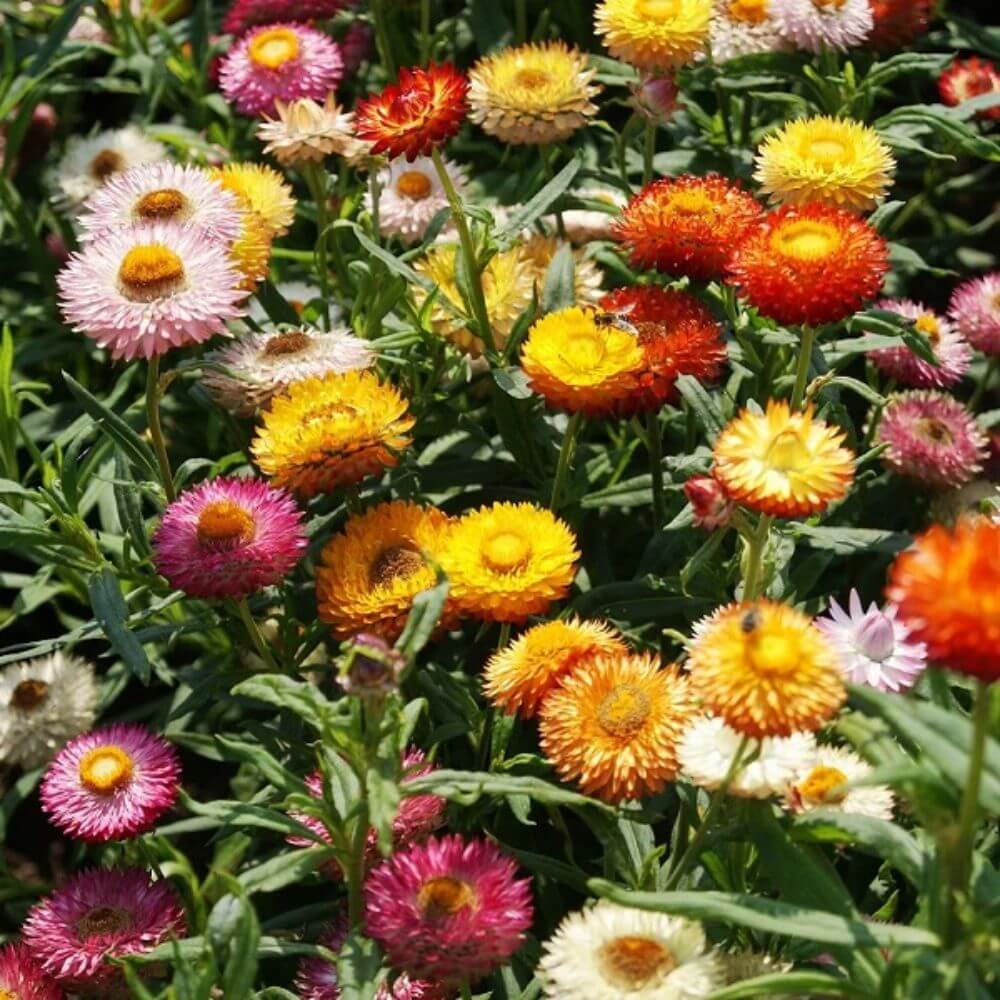
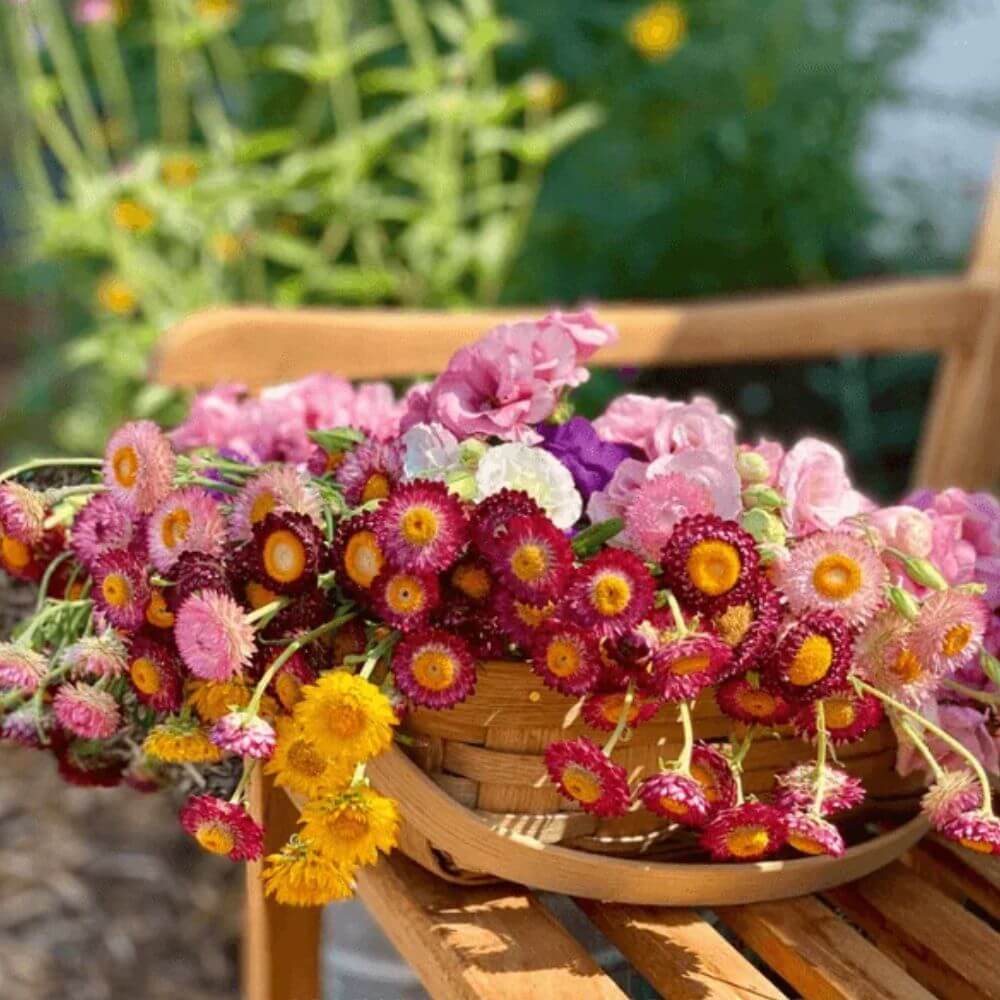
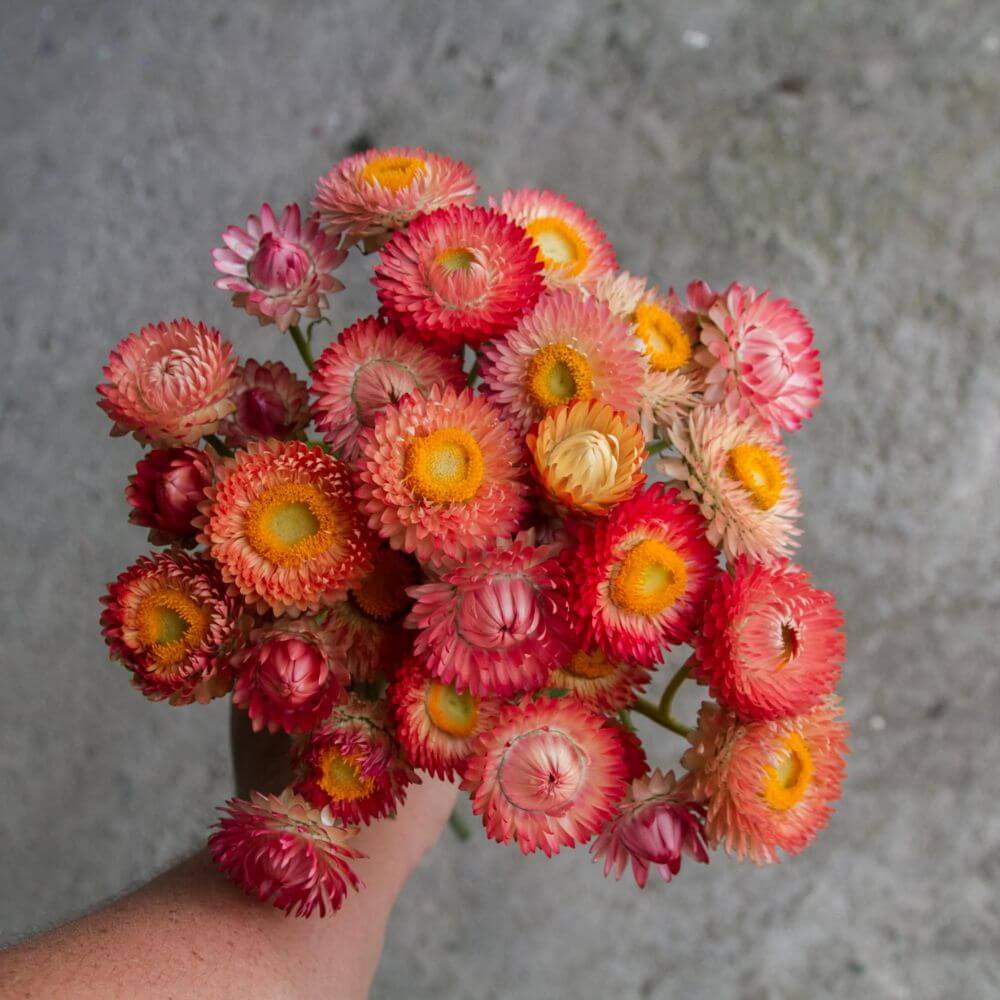
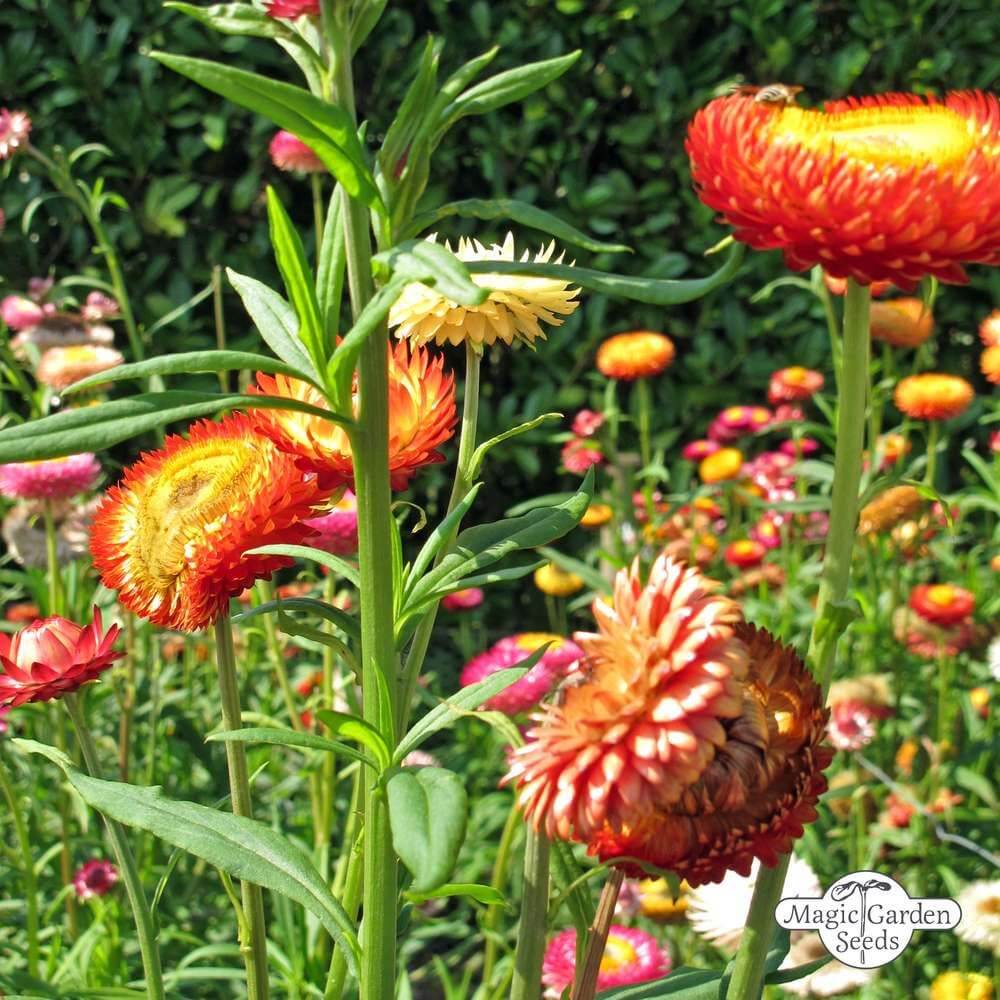
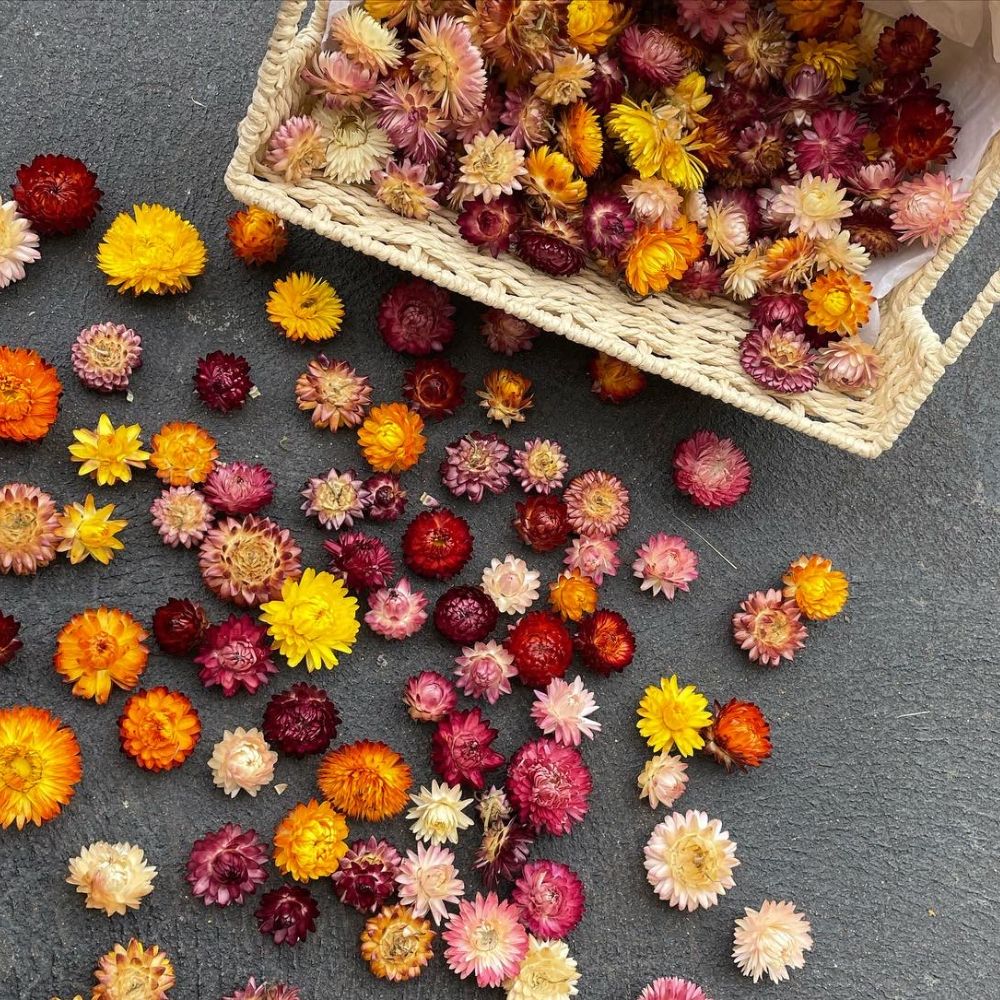
Everlasting Daisy
Popular for fresh bouquets and dried floral arrangements, Strawflower is an excellent addition to containers or sunny borders. It establishes readily from Helichrysum seeds, and from late spring to fall, Strawflower produces many double blooms in a broad range of colors. Strawflower thrives in areas with long, hot summers as they are quite drought tolerant. Helichrysum flowers dry easily and retain their color for months or even years so they are called "everlastings." The daisy-like Strawflower, with its papery blooms, originated in Australia, where several of its relatives grow in the wild. Other names for Strawflower are Everlasting Daisy and Helichrysum Paper Daisy.
FAQ?
What should I do if the seeds do not germinate?
Upon receiving your order, we encourage you to contact our support team for assistance. We are dedicated to providing guidance and assistance. If your seeds do not germinate, we will proceed with a refund. It's essential to note that we only initiate refunds if the seeds fail to germinate following our provided instructions. We cannot take responsibility otherwise. In cases where a chargeback is unilaterally raised, we firmly reject this action as it significantly impacts our business operations. Please refer to our refund policy here for further details.
We prioritize customer satisfaction and are committed to ensuring a positive experience for all our customers. Should you encounter any issues or need further clarification, please do not hesitate to contact us at support@seedsconnect.org.
Thank you for choosing Seeds Connect.
Warm regards,
I've never grown plants from seeds before. Can I do it?
Absolutely! At Seedsconnect, we are here to make your journey into the world of seed planting easy and enjoyable, even if you are a complete beginner with no prior gardening experience.
Think of our seeds as "super seeds" carefully selected for their high germination rates and easy care. We provide clear, detailed instructions to guide you every step of the way, making the process of growing plants a breeze. Embrace planting as a new adventure, a chance to connect with nature and create vibrant green spaces in your living area.
With Seeds Connect, planting is truly a simple and delightful experience. All our seed varieties are popular and widely used, and you can easily find tailored instructions on YouTube or other online resources that suit your preferred gardening style. Embracing the joy of gardening with Seeds Connect is as easy as can be!
Let's embark on your planting journey with Seeds Connect and discover the pleasure of cultivating lush, thriving greenery in your surroundings!
How long can I store the seeds?
At Seeds Connect, feel free to purchase seeds whenever you feel the gardening urge, be it during winter or summer. We are confident in the quality of our seeds, allowing you to store them for up to 2-3 years.
Don't hesitate or worry about the timing, as with Seeds Connect, you can buy seeds anytime throughout the year to be well-prepared for the upcoming spring season. Rest assured that the perfect planting opportunity is always waiting for you with our carefully selected premium seeds.
Embrace the joy of gardening and immerse yourself in a green journey with Seeds Connect. Don't let time pass by without experiencing the delightful flavor of planting and nurturing each fantastic seed.
Purchase your seeds today and indulge in the passion of gardening with Seeds Connect!
How Much Seed Do I Need?
1. Measure
For Squares or Rectangles: measure the length and width of the space where you want to plant.
For Circles: find the radius - measure the widest part of your planting space and divide by 2.
2. Calculate Square Footage

For Squares or Rectangles: length (in feet) x width (in feet) = square feet
For example, a garden that measures 50 feet x 30 feet = 1500 sq. ft.
For Circles: radius (in feet) x radius x 3.14 = square feet
For example, a circular garden that is 20 feet across has a radius of 10 feet. 10 x 10 x 3.14 = 314 sq. ft.
(The mathematical formula for the area of a circle is Π · r2 - the Π symbol is pronounced Pi and represents approximately 3.142, and r2 stands for radius squared.)
3. Find How Much Seed You Need
The amount of seed you should plant depends on the flower display you want. We typically recommend planting on the higher side for a lush meadow. Plant on the lower side for a more scattered look.
For Individual Species: The recommended rates vary greatly from species to species. Check the product page, or contact us with questions.
For Wildflower Mixes: Reference the table below.
| This Much Seed Covers... | This Much Square Footage |
|---|---|
| 1/4 lb | 250 - 500 sq. ft. |
| 1/2 lb | 500 - 1,000 sq. ft. |
| 1 lb | 1,000 - 2,000 sq. ft. |
| 5 lbs | 5,000 - 10,000 sq. ft. |
| 10 lbs | 10,000 - 25,000 sq. ft. |
- 1 Acre = 43,000 sq.ft.
- 1/2 Acre = 21,500 sq. ft.
- 1/4 Acre = 10,750 sq.ft.
- 1/10 Acre = 4,300 sq. ft.
Tips For Larger Plantings: If you have a large site, from 1/2 acre to several acres, your planting rate may be affected by land conditions. If you have heavy weeds on the site now, some erosion, generally poor soil, or other land problems, additional seed is usually the most economical solution, since installation of a large planting usually costs more than the seed itself. If your site does have these problems and you want full coverage, use 1 pound per 1000 sq. ft.





